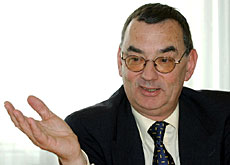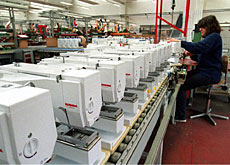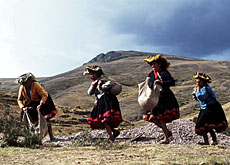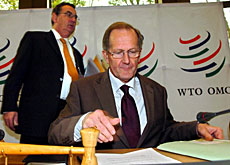Swiss seek to move beyond agriculture at WTO

Progress has to be made on non-agricultural topics at world trade talks in Hong Kong, chief Swiss negotiator Luzius Wasescha tells swissinfo.
But Wasescha refused to make any predictions about the outcome of the World Trade Organization’s (WTO) sixth ministerial conference, which begins on Tuesday.
The six-day meeting in Hong Kong is intended to wrap up the so-called “Doha round” of WTO negotiations. These were launched in 2001 in the capital of Qatar to address poor nations’ concerns about access to rich countries’ agricultural markets.
Ministers will try to break the deadlock and pave the way for a global deal by next year, which would ease restrictions on world trade in general.
But more developed economies such as the European Union and the United States are baulking at making bigger, politically sensitive cuts to farm subsidies and lowering tariffs on food imports.
On their side, developing countries are reluctant to open their markets to goods and services unless agricultural tariffs and subsidies are cut.
swissinfo: What’s at stake for Switzerland at this conference?
Luzius Wasescha: Hong Kong is a necessary conduit for negotiations. Ministers will have five days to talk to one another. Five discussion groups are planned: development, regulation, services, the question of tariffs and agriculture.
For Switzerland it’s important that the negotiations move forward – especially on non-agricultural issues on which we are falling behind.
swissinfo: What can Switzerland do to avert another failed round of talks?
L.W.: We’ve come up with suggestions in all areas. We also hope that we’ll be able to get together with our colleagues in the G10 [group of net food importing countries] and consolidate our views regarding the disputed topics.
swissinfo: Has Switzerland got much room to manoeuvre in these negotiations?
L.W.: It’s quite simple: we have three defensive areas concerning agriculture – notably direct aid – and 12 offensive areas including services and non-agricultural products.
If we can make progress in other areas and achieve a similar situation to that concerning agriculture, then all well and good. If we can’t, we will be creating problems for ourselves.
swissinfo: What would you consider a success?
L.W.: If we could lay the basis for rapidly achieving, over the coming three months, the original goal of this meeting [which was to reach agreement on two-thirds of the Doha talks].
swissinfo: At the start, development was at the centre of the Doha talks. What’s left of that?
L.W.: That is the most important question. What works for those developing countries that are performing well is harming those that aren’t – and vice versa.
This dilemma appears in all the issues. Only the strongest countries can benefit from what is economically advantageous – no one is there to come up with solutions for the weakest.
swissinfo: Non-governmental organisations believe free trade hampers development. What do you say to that?
L.W.: Free trade is beneficial for countries that have goods to trade. Those that have little or nothing need development strategies and not trade.
These weak countries can’t expect any response from the WTO – it must come from the many international organisations which deal with development.
swissinfo: Some people think that the future of multilateral talks is at stake in Hong Kong.
L.W.: That might be true in the short term, but people will always return to multilateral negotiations – it is the only thing that guarantees benefits to all participants.
The big players understand the other big players’ problems, but they haven’t got the energy to take on the leadership in negotiations. The current difficulties reflect that.
swissinfo: More and more countries – including Switzerland – are signing bilateral free-trade agreements. Isn’t this adopting a more egotistic approach?
L.W.: Bilateral and multilateral treaties have the advantage of being able to get further in the short term than within the framework of the WTO. But they are contributing to a fragmentation of the global market. The consequence of these bilateral treaties will be the renaissance of the WTO.
swissinfo-interview: Pierre-François Besson
The sixth ministerial conference of the WTO takes place from December 13-18 in Hong Kong.
The meeting of the organisation’s highest decision-making body should lead to the conclusion of the Doha round of trade talks, launched in Qatar in 2001.
Representatives of 149 countries will attend.
Economics Minister Joseph Deiss will lead the 20-strong Swiss delegation.
Delegates come from the State Secretariat for Economic Affairs, the Swiss Agency for Development and Cooperation, and from five Swiss consulates.
The G10 includes Iceland, Israel, Japan, Liechtenstein, Mauritius, Norway, South Korea and Switzerland

In compliance with the JTI standards
More: SWI swissinfo.ch certified by the Journalism Trust Initiative



You can find an overview of ongoing debates with our journalists here. Please join us!
If you want to start a conversation about a topic raised in this article or want to report factual errors, email us at english@swissinfo.ch.